The Effect of Orthotics on Gait
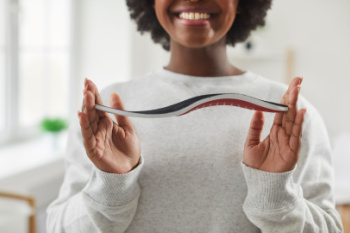
Foot orthotics play an important role in improving gait mechanics and alleviating the discomfort associated with various foot conditions. Custom-made foot orthotics are designed to provide support, stability, and realignment to the foot and ankle connection. Research suggests that foot orthotics can positively affect gait by reducing excessive pronation, controlling foot motion, and redistributing pressure across the foot surface. By correcting biomechanical imbalances and enhancing foot function, orthotics can help to alleviate pain, prevent injuries, and improve overall mobility and stability during walking and other weight-bearing activities. Whether prescribed for addressing specific foot ailments or enhancing athletic performance, foot orthotics offer a non-invasive and effective solution for optimizing gait mechanics and promoting foot health. If you are interested in discussing how custom-made foot orthotics can improve your gait, it is suggested that you consult with a podiatrist who can speak with you about your specific needs.
If you’re experiencing foot discomfort, have a history of foot and ankle injuries, or are interested in exploring Custom orthotics, don’t hesitate to contact Harvey Jacobs, DPM at Quality Foot Care Center. Our doctor is dedicated to offering the care required to help you remain pain-free and stay on your feet.
What are Custom Orthotics?
Custom orthotics refer to custom inserts designed for placement in different shoe types, including athletic and formal footwear, with the purpose of alleviating a spectrum of foot-related problems such as flat feet, heel pain, and overall foot discomfort. These inserts are instrumental in providing relief and comfort for a diverse range of foot conditions, including heel pain, and can also act as a proactive approach to injury prevention.
Medical Grade Shoe Inserts:
A diverse array of shoe inserts is available for addressing foot pain, heel discomfort, and minor issues. For instance, you can place arch supports in your shoes to rectify overarched or flat feet, and gel and cushioned insoles are frequently chosen for the comfort and relief they provide from foot and heel pain by reducing pressure.
If you have any questions please contact our office located in Somerset, NJ . We offer the newest diagnostic and treatment technologies for all your foot and ankle needs.
Wounds That Don't Heal Need to Be Checked
What Is Severe Athlete’s Foot?
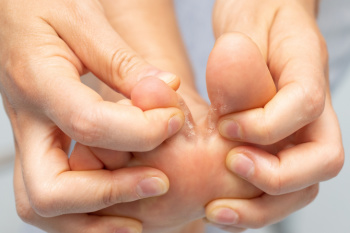 Athlete's foot, a fungal skin infection of the foot, can become severe and cause blisters or ulcers. Severe athlete’s foot can be a persistent and debilitating condition that significantly impacts a patient’s quality of life. The advanced stage of the infection is characterized by intense itching, burning, and a noticeable degradation of the skin on the feet. This includes cracking, peeling, and the emergence of blisters. Ulcers, or deep sores, may appear on the heel or ball of the foot. Where athlete’s foot normally appears between the toes or the side of the foot, severe athlete's foot may spread beyond these areas to the rest of the foot. This can lead to secondary bacterial infections due to the compromised integrity of the skin. Treatment usually includes a multi-step approach, such as prescribed antifungal medications, rigorous hygiene practices, and possibly lifestyle adjustments. If you suspect athlete’s foot, it is suggested that you make an appointment with a podiatrist promptly to prevent the condition from worsening.
Athlete's foot, a fungal skin infection of the foot, can become severe and cause blisters or ulcers. Severe athlete’s foot can be a persistent and debilitating condition that significantly impacts a patient’s quality of life. The advanced stage of the infection is characterized by intense itching, burning, and a noticeable degradation of the skin on the feet. This includes cracking, peeling, and the emergence of blisters. Ulcers, or deep sores, may appear on the heel or ball of the foot. Where athlete’s foot normally appears between the toes or the side of the foot, severe athlete's foot may spread beyond these areas to the rest of the foot. This can lead to secondary bacterial infections due to the compromised integrity of the skin. Treatment usually includes a multi-step approach, such as prescribed antifungal medications, rigorous hygiene practices, and possibly lifestyle adjustments. If you suspect athlete’s foot, it is suggested that you make an appointment with a podiatrist promptly to prevent the condition from worsening.
Athlete’s Foot
Athlete’s foot is often an uncomfortable condition to experience. Thankfully, podiatrists specialize in treating athlete’s foot and offer the best treatment options. If you have any questions about athlete’s foot, consult with Harvey Jacobs, DPM from Quality Foot Care Center. Our doctor will assess your condition and provide you with quality treatment.
What Is Athlete’s Foot?
Tinea pedis, more commonly known as athlete’s foot, is a non-serious and common fungal infection of the foot. Athlete’s foot is contagious and can be contracted by touching someone who has it or infected surfaces. The most common places contaminated by it are public showers, locker rooms, and swimming pools. Once contracted, it grows on feet that are left inside moist, dark, and warm shoes and socks.
Prevention
The most effective ways to prevent athlete’s foot include:
- Thoroughly washing and drying feet
- Avoid going barefoot in locker rooms and public showers
- Using shower shoes in public showers
- Wearing socks that allow the feet to breathe
- Changing socks and shoes frequently if you sweat a lot
Symptoms
Athlete’s foot initially occurs as a rash between the toes. However, if left undiagnosed, it can spread to the sides and bottom of the feet, toenails, and if touched by hand, the hands themselves. Symptoms include:
- Redness
- Burning
- Itching
- Scaly and peeling skin
Diagnosis and Treatment
Diagnosis is quick and easy. Skin samples will be taken and either viewed under a microscope or sent to a lab for testing. Sometimes, a podiatrist can diagnose it based on simply looking at it. Once confirmed, treatment options include oral and topical antifungal medications.
If you have any questions, please feel free to contact our office located in Somerset, NJ . We offer the newest diagnostic and treatment technologies for all your foot care needs.
Managing Plantar Warts
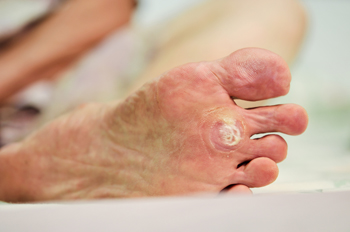
Papillomas, also known as warts, are caused by coming into contact with the human papilloma virus, or HPV. One type of papilloma found on the feet is termed a plantar wart. The HPV virus is commonly picked up in humid communal environments, such as public showers and swimming pools. The best way to avoid being exposed to these contagious papillomas on your feet is to wear appropriate foot coverings in public places such as showers, locker rooms, and pools. A plantar wart typically appears as a small, rough growth on the bottom of your foot, usually at the base of the toes, or on the ball or heel. In some cases, the wart may contain black pinpoints, which are small clotted blood vessels, commonly called wart seeds. While a plantar wart may resolve without treatment, seeking advice from a podiatrist can help to minimize its spread and any discomfort it causes. If the wart reoccurs, and especially if it is bleeding, painful, or there are changes in shape or color, it is suggested that you schedule an appointment with a podiatrist for immediate treatment.
Plantar warts can be very uncomfortable. If you need your feet checked, contact Harvey Jacobs, DPM from Quality Foot Care Center. Our doctor will assist you with all of your foot and ankle needs.
About Plantar Warts
Plantar warts are the result of HPV, or human papillomavirus, getting into open wounds on the feet. They are mostly found on the heels or balls of the feet.
While plantar warts are generally harmless, those experiencing excessive pain or those suffering from diabetes or a compromised immune system require immediate medical care. Plantar warts are easily diagnosed, usually through scraping off a bit of rough skin or by getting a biopsy.
Symptoms
- Lesions on the bottom of your feet, usually rough and grainy
- Hard or thick callused spots
- Wart seeds, which are small clotted blood vessels that look like little black spots
- Pain, discomfort, or tenderness of your feet when walking or standing
Treatment
- Freezing
- Electric tool removal
- Laser Treatment
- Topical Creams (prescription only)
- Over-the-counter medications
To help prevent developing plantar warts, avoid walking barefoot over abrasive surfaces that can cause cuts or wounds for HPV to get into. Avoiding direct contact with other warts, as well as not picking or rubbing existing warts, can help prevent the further spread of plantar warts. However, if you think you have developed plantar warts, speak to your podiatrist. He or she can diagnose the warts on your feet and recommend the appropriate treatment options.
If you have any questions please feel free to contact our office located in Somerset, NJ . We offer the newest diagnostic and treatment technologies for all your foot and ankle needs.
Why Regular Foot Check-Ups Are Important for Older Adults
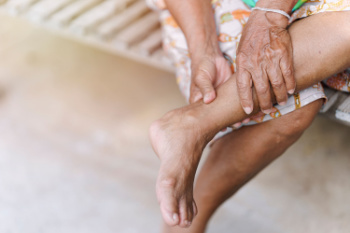 Regular foot check-ups are important for older adults to help identify potential problems early on. Getting treatment for any issues also prevents these problems from escalating into more serious conditions. As people age, changes in foot structure, skin integrity, and circulation can occur, making the feet more susceptible to various issues, such as pain and cracked heels. Regular check-ups become especially important for those with chronic conditions like diabetes or arthritis, as these can significantly impact foot health. Certain conditions, like plantar fasciitis and osteoarthritis, become more likely with repetitive movement and the natural wear and tear that comes with aging. Podiatrists can assess the risk of developing complications, provide personalized advice on footwear, and offer guidance on preventive measures. If you have concerns about your foot health as an older adult, or if you are experiencing foot pain, it is suggested that you schedule an appointment with a podiatrist.
Regular foot check-ups are important for older adults to help identify potential problems early on. Getting treatment for any issues also prevents these problems from escalating into more serious conditions. As people age, changes in foot structure, skin integrity, and circulation can occur, making the feet more susceptible to various issues, such as pain and cracked heels. Regular check-ups become especially important for those with chronic conditions like diabetes or arthritis, as these can significantly impact foot health. Certain conditions, like plantar fasciitis and osteoarthritis, become more likely with repetitive movement and the natural wear and tear that comes with aging. Podiatrists can assess the risk of developing complications, provide personalized advice on footwear, and offer guidance on preventive measures. If you have concerns about your foot health as an older adult, or if you are experiencing foot pain, it is suggested that you schedule an appointment with a podiatrist.
If you need your feet checked, contact Harvey Jacobs, DPM of Quality Foot Care Center. Our doctor will attend to all of your foot and ankle needs and provide you with quality treatment.
Geriatrics and Podiatry
When people age, some common issues that may occur are bone density loss, dry skin, poor circulation, and rough brittle nails. These issues may also affect your foot health if the necessary steps are not taken to alleviate the problems.
It is important to take care of your feet because feet that are injured or diseased can affect your overall health. Having painful feet hinders your ability to do daily activities or may decrease your willingness to do the things that you need to do.
Visiting Your Geriatrician
As we age, health problems become more likely, so it is essential to visit your doctor for check-ups to ensure that you are doing the best you can to take care of your health. It is recommended to check your feet frequently for any possible cuts, bruises, swelling, corns or any other irregularities.
Taking Care of Elderly Feet
Cracked or dry feet can be treated by applying moisturizer often. It is also important not to wear old socks because the older the sock is, the higher the possibility there will be that there is bacteria there. Wear fresh socks and make sure they fit properly.
Proper foot health means that you can have a more active lifestyle and you will not be bogged down by pain. Foot health also leads to good circulation, which is paramount for overall health.
If you have any questions, please feel free to contact our office located in Somerset, NJ . We offer the newest diagnostic tools and technology to treat your foot and ankle needs.
Nighttime Foot Pain
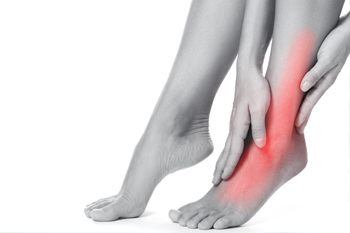
Nighttime foot pain can stem from various sources, including lifestyle factors and medical conditions. Whether it's a dull, persistent ache or a throbbing sensation in different areas of the feet, such discomfort can significantly disrupt sleep and worsen with poor rest. Factors such as prolonged standing or sitting, wearing ill-fitting footwear, and certain sleeping positions can contribute to this discomfort. Additionally, conditions like Morton’s neuroma, plantar fasciitis, sciatica, fibromyalgia, diabetes, and peripheral neuropathy can all contribute to nocturnal foot pain. Treatment options range from simple lifestyle adjustments, like staying hydrated and performing gentle foot exercises, to medical interventions such as anti-inflammatory medications, special exercises, and orthotics interventions. If you have nighttime foot pain, it is suggested that you make an appointment with a podiatrist for a proper diagnosis and to address any underlying conditions you might have.
Foot Pain
Foot pain can be extremely painful and debilitating. If you have a foot pain, consult with Harvey Jacobs, DPM from Quality Foot Care Center. Our doctor will assess your condition and provide you with quality foot and ankle treatment.
Causes
Foot pain is a very broad condition that could be caused by one or more ailments. The most common include:
- Bunions
- Hammertoes
- Plantar Fasciitis
- Bone Spurs
- Corns
- Tarsal Tunnel Syndrome
- Ingrown Toenails
- Arthritis (such as Gout, Rheumatoid, and Osteoarthritis)
- Flat Feet
- Injury (from stress fractures, broken toe, foot, ankle, Achilles tendon ruptures, and sprains)
- And more
Diagnosis
To figure out the cause of foot pain, podiatrists utilize several different methods. This can range from simple visual inspections and sensation tests to X-rays and MRI scans. Prior medical history, family medical history, and any recent physical traumatic events will all be taken into consideration for a proper diagnosis.
Treatment
Treatment depends upon the cause of the foot pain. Whether it is resting, staying off the foot, or having surgery; podiatrists have a number of treatment options available for foot pain.
If you have any questions, please feel free to contact our office located in Somerset, NJ . We offer the newest diagnostic and treatment technologies for all your foot care needs.
Custom Orthotics For Seniors

Age gracefully and move freely with Custom Orthotics. For seniors seeking to maintain their independence, Custom Orthotics offer the stability and comfort essential for daily activities. Custom-tailored to your feet, they provide support, reduce pain, and enhance mobility, ensuring you're always on sure footing. Don't let age-related foot concerns hold you back. With Custom Orthotics, embrace every golden moment with confidence. Call today to schedule an appointment.
Myths About Custom Orthotics
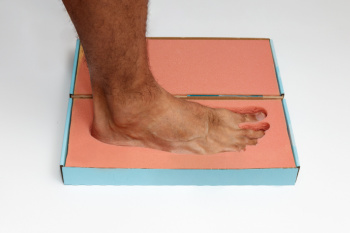
Custom foot orthoses have a rich history, dating back to the mid-19th century when Lewis Durlacher created molded leather devices to address foot issues for Queen Victoria. Over the years, several myths have emerged about the function and effects of custom orthoses. First, custom orthotics are personalized medical devices designed to optimize foot and lower extremity function by modifying ground reaction forces' timing, location, and magnitude. They do not force the foot into specific joint positions but work with their unique morphology, stiffness, and cushioning properties to achieve therapeutic goals. Custom foot orthoses serve various purposes, from relieving diabetic neuropathic ulcers to reducing tension stress in conditions like plantar fasciitis. They also redirect ground reaction forces to prevent bending moments responsible for stress fractures and other issues. That there is one best way to design custom orthoses is another myth. The flexibility of custom orthoses allows for tailored solutions for different pathologies. Lastly, the notion that custom foot orthoses weaken feet over time lacks scientific backing. In fact, research suggests that they can enhance foot muscle activation. If you would like to understand more about how custom orthotics might help you, it is suggested that you make an appointment with a podiatrist.
If you are experiencing discomfort in your feet and would like to try custom orthotics, contact Harvey Jacobs, DPM from Quality Foot Care Center. Our doctor can provide the care you need to keep you pain-free and on your feet.
What Are Custom Orthotics?
Custom orthotics are inserts you can place into your shoes to help with a variety of foot problems such as flat feet or foot pain. Orthotics provide relief and comfort for minor foot and heel pain.
Over-the-Counter Inserts
Shoe inserts come in a wide variety and are used to treat foot pain, heel pain, and minor problems. For example, arch supports can be inserted into your shoes to help correct overarched or flat feet, while gel insoles are often used because they provide comfort and relief from foot and heel pain by alleviating pressure.
Prescription Orthotics
If over-the-counter inserts don’t work for you or if you have a more severe foot concern, it is possible to have your podiatrist prescribe custom orthotics. These high-quality, custom inserts are designed to treat problems such as abnormal motion, plantar fasciitis, and severe forms of heel pain. They can even be used to help patients suffering from diabetes by treating foot ulcers and painful calluses and are usually molded to your feet individually, which allows them to provide full support and comfort.
If you're experiencing minor to severe foot or heel pain, it’s recommended to speak with your podiatrist about the possibility of using custom orthotics or shoe inserts. A podiatrist can determine which type of custom orthotic or shoe insert is right for you and help you take the first steps toward being pain-free.
If you have any questions please contact our office located in Somerset, NJ . We offer the newest diagnostic and treatment technologies for all your foot and ankle needs.
Root Causes of Heel Pain
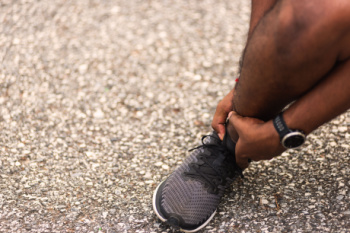
Understanding the root causes of heel pain is essential for effective treatment. Mechanical factors such as acute injuries, like a ruptured plantar fascia, are common causes of heel pain. Degenerative conditions, such as plantar fasciitis or calcaneal stress fractures, also may significantly affect the heel. Neurologic causes, including nerve compression and inflammation of the Achilles tendon, can cause heel discomfort, especially during activities. Rheumatologic conditions, such as psoriatic arthritis or rheumatoid arthritis, can lead to chronic inflammation and persistent heel pain. Differentiating between these causes is vital for tailored treatment plans, which may involve orthotic devices, certain exercises, or reducing pressure on affected tendons during acute phases. Additionally, addressing contributing factors like foot pronation, inadequate footwear, or high-impact physical activities is important for long-term management. If you are experiencing heel pain that interferes with your daily activities, it is suggested that you schedule an appointment with a podiatrist for a full exam and diagnosis, followed by suggesting correct treatment options for you.
Many people suffer from bouts of heel pain. For more information, contact Harvey Jacobs, DPM of Quality Foot Care Center. Our doctor can provide the care you need to keep you pain-free and on your feet.
Causes of Heel Pain
Heel pain is often associated with plantar fasciitis. The plantar fascia is a band of tissues that extends along the bottom of the foot. A rip or tear in this ligament can cause inflammation of the tissue.
Achilles tendonitis is another cause of heel pain. Inflammation of the Achilles tendon will cause pain from fractures and muscle tearing. Lack of flexibility is also another symptom.
Heel spurs are another cause of pain. When the tissues of the plantar fascia undergo a great deal of stress, it can lead to ligament separation from the heel bone, causing heel spurs.
Why Might Heel Pain Occur?
- Wearing ill-fitting shoes
- Wearing non-supportive shoes
- Weight change
- Excessive running
Treatments
Heel pain should be treated as soon as possible for immediate results. Keeping your feet in a stress-free environment will help. If you suffer from Achilles tendonitis or plantar fasciitis, applying ice will reduce the swelling. Stretching before an exercise like running will help the muscles. Using all these tips will help make heel pain a condition of the past.
If you have any questions please contact our office located in Somerset, NJ . We offer the newest diagnostic and treatment technologies for all your foot and ankle needs.
It's Time for Beautiful Feet
More...
How to Find Foot Pain Relief From Arthritis
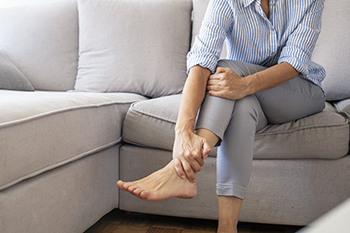 There are multiple varieties of arthritis, and a challenge many of them share in common is foot pain. Arthritic foot care is important to finding relief from arthritis, a condition that has no cure. Luckily, help from a podiatrist, lifestyle modifications, and physical therapy can all contribute to happier feet. If you have foot pain, it is suggested you consult a podiatrist who can provide personalized guidance based on your condition. They may recommend suitable footwear with good arch support and cushioning to reduce pressure on the affected joints. Podiatrists may also recommend regular stretching exercises, such as gentle calf stretches and toe exercises, which can help maintain flexibility and alleviate stiffness in the feet. Lifestyle modifications, such as losing weight and switching to lower-impact exercise, can also be important to arthritic foot care. Over-the-counter or prescribed medications can be part of the treatment plan, and in some cases, your podiatrist may suggest custom orthotic inserts to provide additional support to your feet. If you are experiencing foot pain from arthritis, it is suggested that you make regular appointments with a podiatrist for ongoing care.
There are multiple varieties of arthritis, and a challenge many of them share in common is foot pain. Arthritic foot care is important to finding relief from arthritis, a condition that has no cure. Luckily, help from a podiatrist, lifestyle modifications, and physical therapy can all contribute to happier feet. If you have foot pain, it is suggested you consult a podiatrist who can provide personalized guidance based on your condition. They may recommend suitable footwear with good arch support and cushioning to reduce pressure on the affected joints. Podiatrists may also recommend regular stretching exercises, such as gentle calf stretches and toe exercises, which can help maintain flexibility and alleviate stiffness in the feet. Lifestyle modifications, such as losing weight and switching to lower-impact exercise, can also be important to arthritic foot care. Over-the-counter or prescribed medications can be part of the treatment plan, and in some cases, your podiatrist may suggest custom orthotic inserts to provide additional support to your feet. If you are experiencing foot pain from arthritis, it is suggested that you make regular appointments with a podiatrist for ongoing care.
Arthritis can be a difficult condition to live with. If you are seeking treatment, contact Harvey Jacobs, DPM from Quality Foot Care Center. Our doctor can provide the care you need to keep you pain-free and on your feet.
Arthritic Foot Care
Arthritis is a joint disorder that involves the inflammation of different joints in your body, such as those in your feet. Arthritis is often caused by a degenerative joint disease and causes mild to severe pain in all affected areas. In addition to this, swelling and stiffness in the affected joints can also be a common symptom of arthritis.
In many cases, wearing ill-fitting shoes can worsen the effects and pain of arthritis. Wearing shoes that have a lower heel and extra room can help your feet feel more comfortable. In cases of rheumatoid arthritis, the arch in your foot may become problematic. Buying shoes with proper arch support that contour to your feet can help immensely.
Alleviating Arthritic Pain
- Exercises that stretch the foot can prevent further pain and injury and increase mobility
- Most of the pain can be alleviated with anti-inflammatory drugs, heat, and topical medications
- Massages can help temporarily alleviate pain.
It is best to see your doctor for the treatment that is right for your needs and symptoms. Conditions vary, and a podiatrist can help you determine the right method of care for your feet.
If you have any questions, please feel free to contact our office located in Somerset, NJ . We offer the newest diagnostic tools and technology to treat your foot and ankle needs.
Causes of Puffy and Swollen Feet
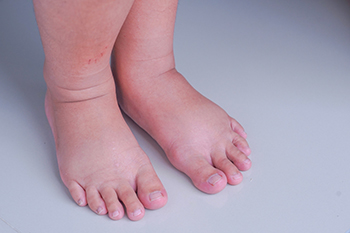
Swollen feet, a common occurrence, can be attributed to various factors that impact the delicate balance of fluid regulation in the body. One primary cause is fluid retention, often linked to prolonged periods of standing or sitting, particularly in hot weather. The force of gravity hinders efficient circulation, leading to fluid pooling in the lower extremities. Additionally, dietary choices high in sodium can contribute to water retention, exacerbating swelling. Injuries or trauma, such as sprains or fractures, may trigger localized swelling as the body's natural response to inflammation. Conditions like venous insufficiency or deep vein thrombosis disrupt blood flow, promoting fluid accumulation. Pregnancy and hormonal fluctuations can also lead to swelling in the feet. If your feet are swollen, it is suggested that you consult a podiatrist who can determine what the cause is, and offer appropriate relief methods.
Swollen feet can be a sign of an underlying condition. If you have any concerns, contact Harvey Jacobs, DPM of Quality Foot Care Center. Our doctor can provide the care you need to keep you pain-free and on your feet.
Swollen feet are a common ailment among pregnant women and people who stand or sit for extended periods. Aging may increase the possibility of swollen feet and patients who are obese often notice when their feet are swelling too. There may be medical reasons why swollen feet occur:
- Phlebitis - A condition that causes the veins to become inflamed and can also cause leg pain.
- Liver disease - This may lead to low blood levels of albumin which is a protein. This can cause fluid in the blood to pass into the tissues and several areas of the body can become swollen.
- Heart failure - When the heart doesn’t pump properly the blood that is normally pumped back to the heart can pool in the veins of the legs causing swollen feet.
- Kidney disease - One of the main functions of the kidneys is releasing excess fluid in the body. This type of condition can make it difficult for the kidneys to function properly, and as a result the feet may become swollen.
- Deep-vein thrombosis (DVT)- This is a serious condition where blood clots form in the veins of the legs. They can block the return of blood from the legs to the heart which may cause the feet to swell. It is important to be treated by a podiatrist if this condition is present.
Swollen feet can also be caused by bone and tendon conditions, including fractures, arthritis, and tendinitis. Additionally, there may be skin and toenail conditions and an infection may cause the feet to swell. Patients who take medicine to treat high blood pressure may be prone to getting swollen feet.
Many patients elevate their feet to help relieve the swelling and this is generally a temporary remedy. When a podiatrist is consulted the reason behind the swelling can be uncovered and subsequently treated.
If you have any questions please feel free to contact our office located in Somerset, NJ . We offer the newest diagnostic tools and technology to treat your foot and ankle needs.
Symptoms and Long-Term Implications of a Broken Toe
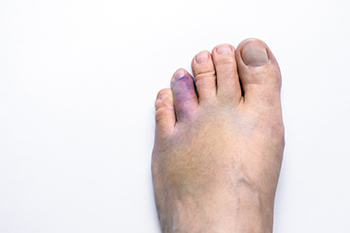
A broken toe, though seemingly minor, can yield noticeable symptoms and potential long-term complications. Immediate signs include pain, swelling, and bruising around the affected toe. Limited mobility and difficulty bearing weight are common, making daily activities challenging. If left untreated, a broken toe may lead to complications, such as deformities where the toe heals in a misaligned position. Chronic pain can persist, hindering mobility. In some cases, arthritis may develop, accelerating joint degeneration over time. Nerve damage is another potential consequence, causing tingling or numbness. Seeking prompt medical attention, including having X-rays taken for an accurate diagnosis, is vital to ensure proper realignment and minimize the risk of enduring complications. If you have endured a broken toe, it is suggested that you visit a podiatrist who can effectively treat this condition and guide you toward avoiding long-term complications.
Broken toes may cause a lot of pain and should be treated as soon as possible. If you have any concerns about your feet, contact Harvey Jacobs, DPM from Quality Foot Care Center. Our doctor will treat your foot and ankle needs.
What Is a Broken Toe?
A broken toe occurs when one or more of the toe bones of the foot are broken after an injury. Injuries such as stubbing your toe or dropping a heavy object on it may cause a toe fracture.
Symptoms of a Broken Toe
- Swelling
- Pain (with/without wearing shoes)
- Stiffness
- Nail Injury
Although the injured toe should be monitored daily, it is especially important to have a podiatrist look at your toe if you have severe symptoms. Some of these symptoms include worsening or new pain that is not relieved with medication, sores, redness, or open wounds near the toe.
If you have any questions, please feel free to contact our office located in Somerset, NJ . We offer the newest diagnostic and treatment technologies for all your foot care needs.
Understanding Foot Stress Fractures
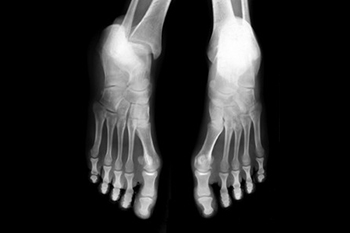
A foot stress fracture, a microscopic crack in a bone, can bring discomfort and disruption to one's daily activities. Typically caused by repetitive stress and overuse, these fractures often occur in weight-bearing bones, such as the metatarsals. These bones often endure more force than they can handle, leading to tiny cracks that, when compounded over time, manifest as stress fractures. Athletes engaging in high-impact activities, dancers, and military personnel are particularly susceptible due to the repetitive nature of their routines. Factors like sudden increases in activity intensity, improper footwear, or inadequate recovery periods can elevate the risk. Early recognition of symptoms such as localized pain, swelling, and tenderness is essential for timely intervention. Adopting preventive measures, such as a gradual increase in activity levels, and incorporating rest into routines can significantly decrease the risk of foot stress fractures. If you have developed a foot stress fracture, it is suggested that you confer with a podiatrist who can offer the treatment method that is right for you.
Stress fractures occur when there is a tiny crack within a bone. To learn more, contact Harvey Jacobs, DPM from Quality Foot Care Center. Our doctor can provide the care you need to keep you pain free and on your feet.
How Are They Caused?
Stress fractures are the result of repetitive force being placed on the bone. Since the lower leg and feet often carry most of the body’s weight, stress fractures are likely to occur in these areas. If you rush into a new exercise, you are more likely to develop a stress fracture since you are starting too much, too soon. Pain resulting from stress fractures may go unnoticed at first, however it may start to worsen over time.
Risk Factors
- Gender – They are more commonly found in women compared to men.
- Foot Problems – People with unusual arches in their feet are more likely to develop stress fractures.
- Certain Sports – Dancers, gymnasts, tennis players, runners, and basketball players are more likely to develop stress fractures.
- Lack of Nutrients – A lack of vitamin D and calcium may weaken the bones and make you more prone to stress fractures
- Weak Bones – Osteoporosis can weaken the bones therefore resulting in stress fractures
Stress fractures do not always heal properly, so it is important that you seek help from a podiatrist if you suspect you may have one. Ignoring your stress fracture may cause it to worsen, and you may develop chronic pain as well as additional fractures.
If you have any questions, please feel free to contact our office located in Somerset, NJ . We offer the newest diagnostic and treatment technologies for all your foot care needs.


